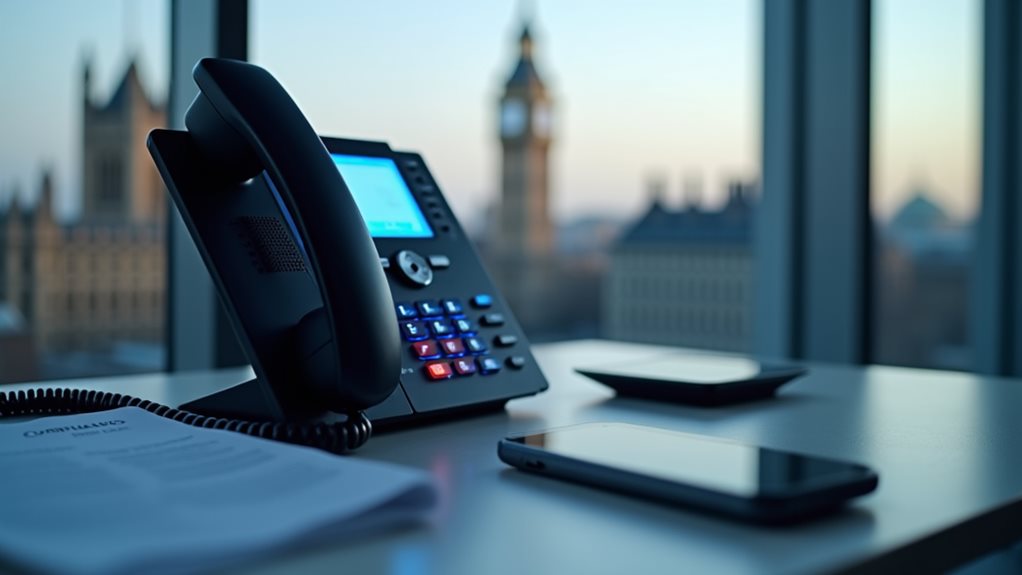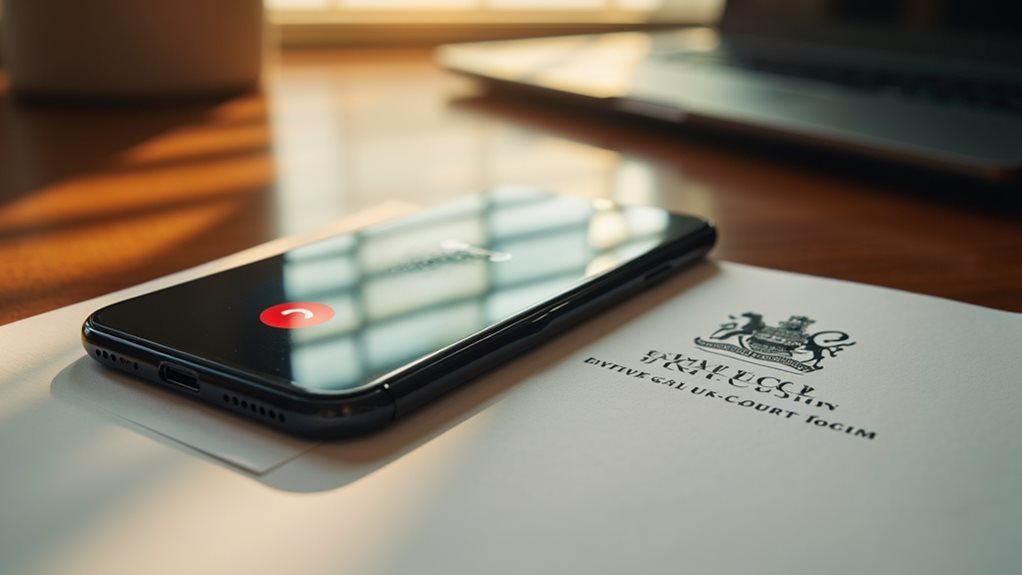Recording phone calls in the UK isn't outright illegal, but you'll need to follow specific rules. For personal use, you can record your own calls without telling others, though it's ethically better to inform them. If you're a business, you must comply with GDPR and RIPA regulations, obtain consent, and implement proper data protection measures. Breaking these rules can result in hefty fines up to £17 million. Understanding the full legal framework will help you navigate compliance requirements confidently.
The Legal Framework Behind Phone Call Recording
While recording phone calls might seem like a straightforward process, the legal framework in the UK is actually quite complex and heavily regulated.
You'll need to navigate the Regulation of Investigatory Powers Act 2000 (RIPA) and various telecommunications regulations that govern these activities.
Understanding the legal implications is essential for anyone considering call recording. For personal use, private recording is generally permitted without requiring explicit consent from other parties.
The law requires you to inform all participants that they're being recorded and provide a valid reason for doing so.
These consent requirements aren't just formalities – they're necessary components of compliance with both GDPR and the Data Protection Act 2018.
You're looking at potential fines of up to £17 million or 4% of your annual global turnover if you don't follow these regulations correctly, so it's critical to guarantee you're meeting all legal obligations. Retention periods for recorded calls can vary significantly by industry, with some businesses required to keep recordings for up to 25 years depending on their sector.
Individual Rights and Personal Call Recording
The fundamental rights of individuals regarding personal call recording in the UK present both freedoms and limitations that you'll need to understand.
While you're permitted to record your own calls without informing others, ethical considerations suggest it's best to obtain personal consent before doing so. Implementing strong passwords for your recording devices and systems is also crucial for safeguarding the data collected.
You'll want to remember that while recording for private use is legal, sharing these recordings without permission isn't.
Your rights under GDPR allow you to make recordings, but you're obligated to keep them confidential.
The Regulation of Investigatory Powers Act provides the legal framework that permits individuals to record their personal calls.
If you're thinking about recording calls, consider implementing secure storage practices and having a clear purpose for the recording.
Under the latest guidelines, data protection officers must oversee compliance with privacy regulations in organizations that regularly record calls. This approach helps you maintain trust and respect privacy while staying within legal boundaries – essential aspects of responsible call recording in today's interconnected world.
Business Requirements for Recording Calls

Moving beyond personal call recording, businesses face a distinct set of legal obligations and requirements when implementing call recording systems.
You'll need to establish clear business policies that outline the specific purposes for recording calls, whether it's for quality assurance, regulatory compliance, or fraud prevention. Additionally, proper consent management is vital – you must inform all parties that they're being recorded. Your business must also register with ICO to legally store recorded call data. Furthermore, implementing systems that utilize VoIP technology can enhance your recording capabilities and ensure compliance with legal obligations.
Your organization should guarantee compliance with GDPR principles and industry-specific regulations. If you're in financial services, you'll need to follow FCA guidelines, while healthcare providers must adhere to GMC standards. Failure to comply with these regulations can result in severe financial penalties of up to £17.5 million or 4% of global annual turnover.
Data Protection and GDPR Compliance
Since recording phone calls involves processing personal data, you'll need to guarantee strict compliance with GDPR regulations to protect both your interests and those of your callers.
As a member of the business community, you're responsible for maintaining robust data security measures and following privacy regulations when handling recorded conversations.
To stay compliant, you'll need to inform callers about recording activities, obtain explicit consent, and clearly explain how you'll use and store their data.
Make sure you're documenting these processes and training your staff on proper procedures.
Storing recorded calls requires secure data storage to prevent unauthorized access and potential breaches under RIPA guidelines.
It's crucial to regularly review your recordings and delete any that aren't necessary, while keeping your storage systems secure.
Non-compliance with GDPR can result in fines of up to €20 million for violations.
When Recording Calls Without Consent Is Permitted

Under specific circumstances, businesses can legally record calls without explicit consent, provided they meet strict regulatory requirements and legitimate business purposes. VoIP security fundamentals dictate the importance of having adequate measures in place to protect recorded data from unauthorized access.
You'll find this particularly applies when recordings are needed to document business transactions or guarantee compliance procedures are being followed. If you're running a business, you're allowed to record calls for quality control, preventing crime, or maintaining effective telecom operations.
The Telecommunications Regulations 2000 outlines specific scenarios where businesses can legally record communications. However, you'll need to follow GDPR principles and register with the Information Commissioner's Office.
While you don't always need explicit consent, it's important to inform parties that recording is taking place through automated messages or operator scripts. For personal use, single-party consent is legally sufficient without requiring notification to other participants.
Legal Consequences of Improper Call Recording
Breaking the rules around call recording can lead to serious legal repercussions, whether you're an individual or a business. The legal risks can range from civil lawsuits under RIPA to substantial fines for privacy concerns and data protection breaches.
For individuals, sharing recorded conversations without consent is strictly prohibited and can result in civil action. You'll also need to be careful about data protection requirements under GDPR.
Businesses face even stricter consequences, including fines up to £10,000 for non-compliance, as demonstrated in recent cases. You're required to notify customers about recording, maintain secure storage of recordings, and register with the ICO. Strong security measures are vital to ensure compliance and protect sensitive data when recording conversations.
Beyond financial penalties, your reputation could suffer significant damage if you're found violating these regulations, affecting both customer trust and business relationships.
Frequently Asked Questions
Can Police Officers Record Phone Calls Without Informing the Other Party?
Yes, you'll find that police procedures allow officers to record calls without consent in specific situations like national security, crime prevention, or public safety – but they typically follow best practices by informing parties.
Do Phone Recording Apps Require Special Licenses or Permissions in the UK?
You don't need special licenses for recording apps, but you'll need to guarantee recording consent from all parties and understand legal implications under data protection laws. It's about following proper privacy practices.
How Long Should Businesses Retain Recorded Phone Calls Before Deletion?
You'll need to align your call retention policies with your specific industry requirements and business compliance guidelines. Keep recordings only as long as necessary for your purpose, then securely delete them to stay compliant.
Are Recordings From Video Calling Platforms Like Zoom Governed by Similar Laws?
Yes, your video call recordings are governed by the same laws. You'll need to follow similar consent requirements and data protection rules whether you're recording on Zoom, Teams, or other platforms.
Can Recorded Calls Be Used as Evidence in Employment Tribunals?
You'll find that employment tribunals can accept your recorded calls as evidence. However, you should follow proper recording policies and understand evidence admissibility rules to guarantee your recordings will be considered legitimate.
Final Thoughts
Whether you're recording calls for personal or business purposes, you'll need to understand and follow the UK's legal requirements carefully. Remember that consent is usually necessary, and you must comply with GDPR guidelines when storing recordings. If you're unsure about specific situations, it's worth consulting legal professionals to protect yourself from potential penalties. Stay informed about your rights and responsibilities to guarantee your call recording practices remain lawful.

